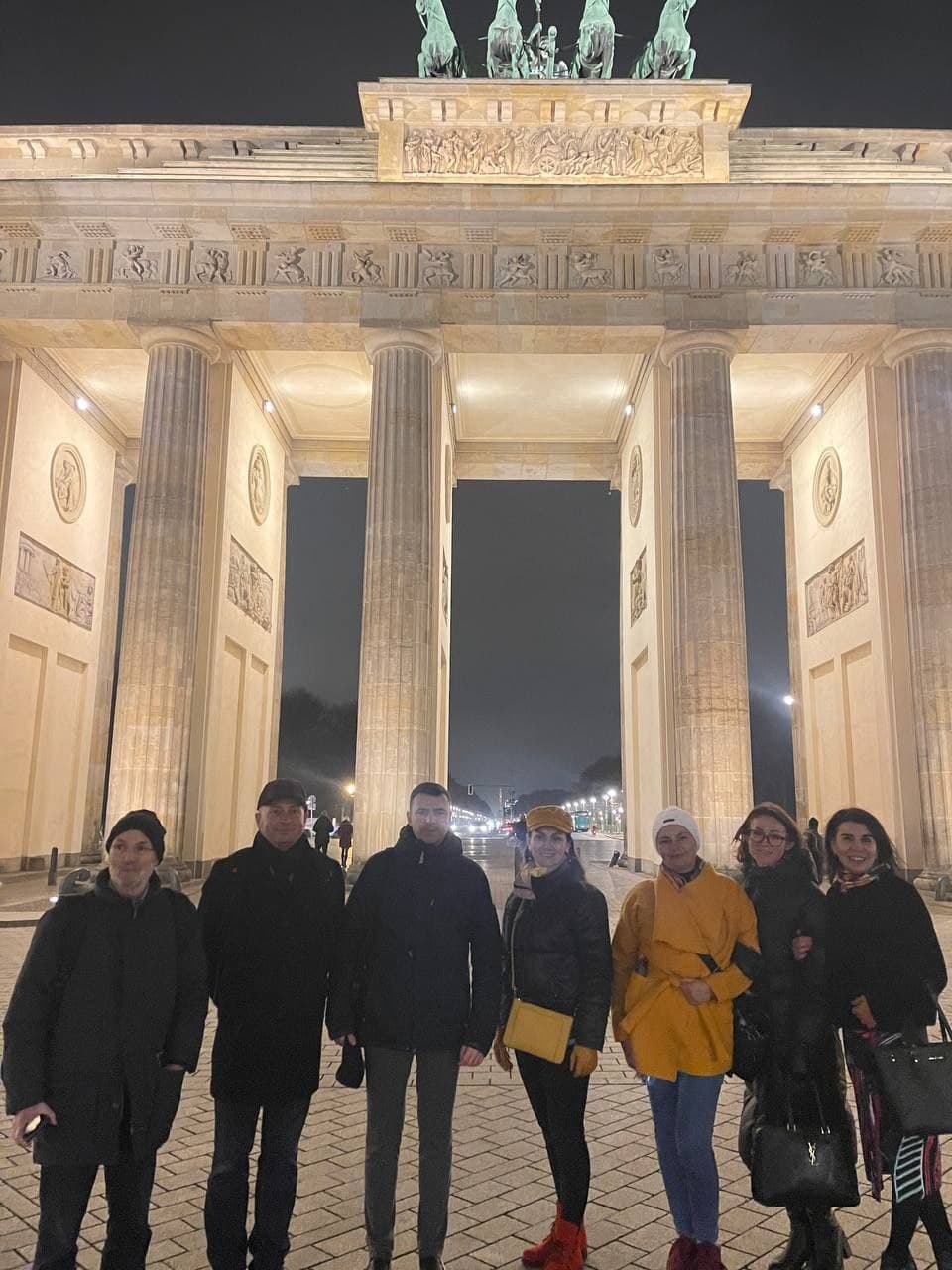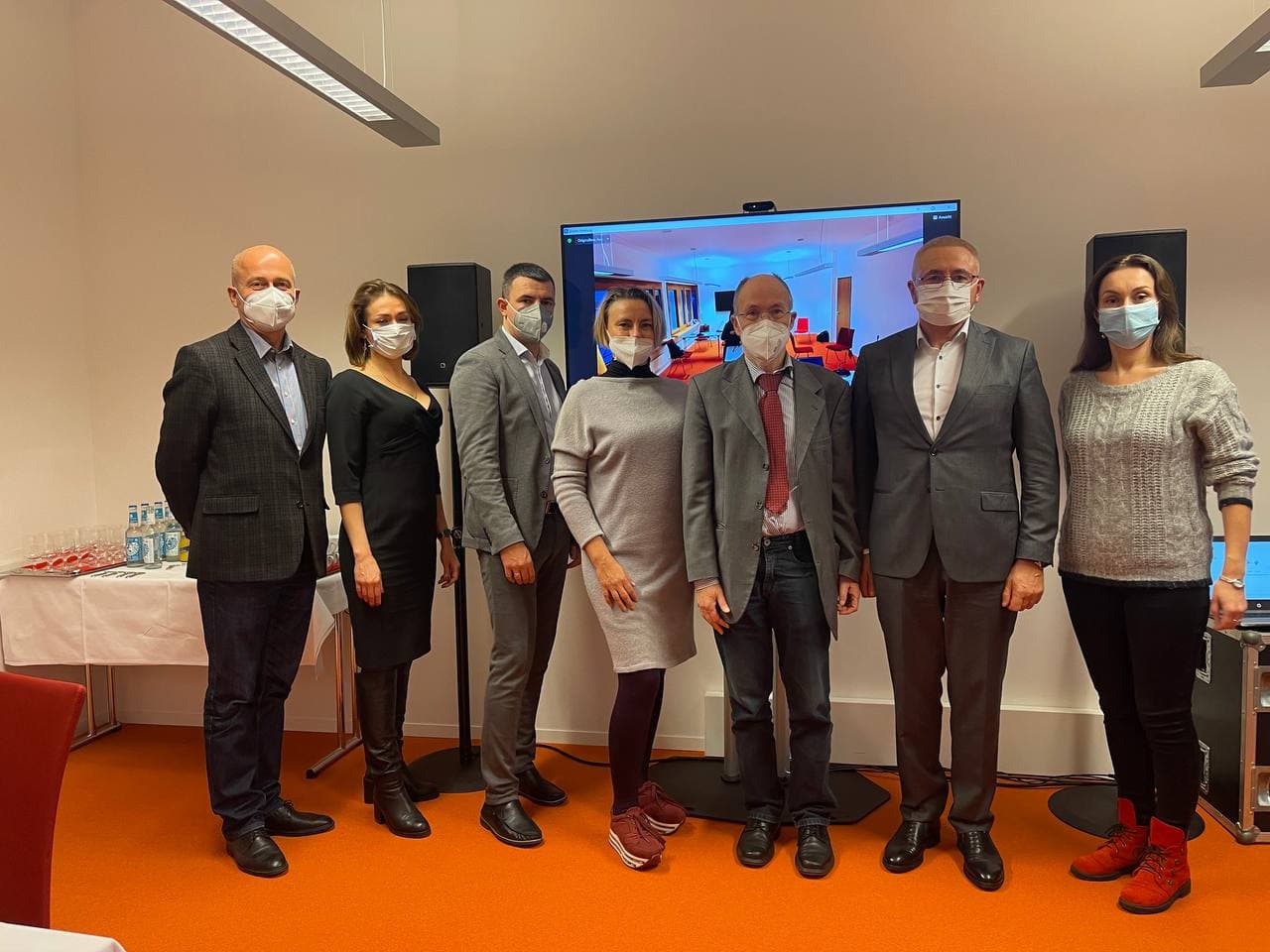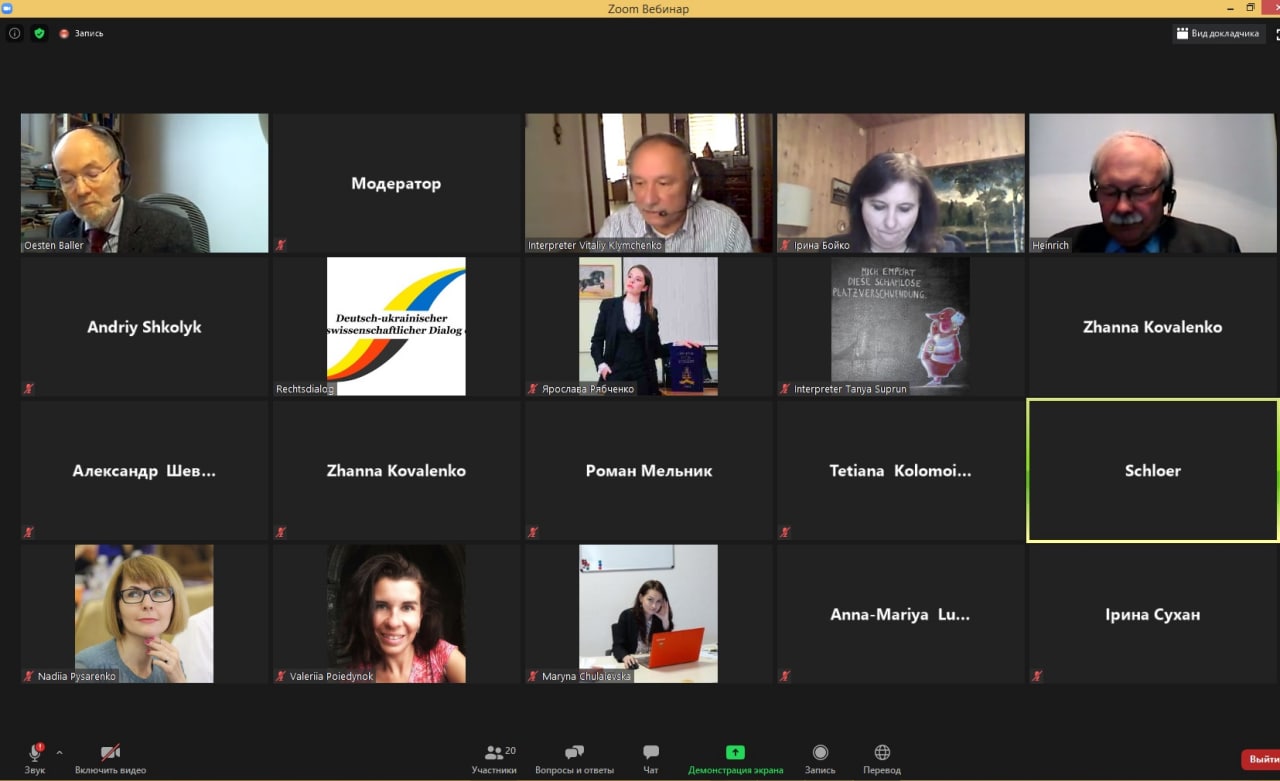With the participation of the Director of the Institute of Public Law of the University of Göttingen, Prof. Dr. Th. Mann, University of Modern Knowledge Kyiv and the Center of German Law of the Faculty of International Relations of the National Aviation University of Kyev (NAU)
the project "Changes in the legal institutions of citizenship and residence for temporarily displaced persons and refugees in Ukraine and the EU since 2014" has been launched.
Relevance of the topic. Citizenship and the legal status of a foreigner play a key role in the life of every person, as they represent one of the most important elements of their legal status, including all rights and obligations. Article 15 of the Human Rights Charter even defines citizenship as one of the fundamental rights. The meaning of Article 15 is that one can only expect a full set of fundamental rights if one has a citizenship. As is well known, the state grants its citizens more rights and obligations than people without the respective citizenship, such as foreigners, stateless persons, refugees and temporarily displaced persons, and only citizens of a state have the right and the opportunity to have a say in the political life of their state and society. So in the life of every state and federation of states, the importance of the legal institution of citizenship and the complex of legal relationships that arise in the area of residence law can hardly be underestimated. Since 2014, partly intertwined geopolitical developments have been observed in both Ukraine and the EU, which have a significant impact on the design and changes to the two legal institutions, namely citizenship and residence for temporarily displaced persons and refugees, and which require a systematic and comparative legal analysis. The Ukrainian legal institutions mentioned have experienced their first major changes since the shift in power in 2014 and the Crimean and Donbass crises and the resulting first wave of refugees: among other things, a new term “temporarily displaced person” was introduced. Another innovation in the legal regulation of the legal institution of Ukrainian citizenship was that foreigners were granted Ukrainian citizenship in order to enable them to work in state structures or to obtain civil service status such as military service, which has led to further changes since the outbreak of the Russian-Ukrainian military confrontation. The EU also experienced a wave of refugees in 2015, including: from Africa and Asia, which has also had a significant impact on the legislation in the area of residence rights in the EU member states. Since the outbreak of the Russian-Ukrainian war in 2022, and in particular the subsequent second massive wave of refugees into the EU member states, this time from Ukraine, the EU has had to adopt further new regulations, the content and legality of which are to be scientifically examined.



With the financial support of the Ministry of Foreign Affairs of the Federal Republic of Germany
in Germany and Ukraine launched a series of hybrid (off line and online) seminars on "Openness and Legality of Public Administration: International Lessons from the Coronavirus Crisis"
German organizer is German-Ukrainian School of Governance NGO,
Ukrainian organizer is NGO "Ukrainian-German Jurisprudential Dialogue" (rechtsdialog, org).
November 15-16, 2021 - hybrid seminar (Berlin - Kyiv).
December 7 to 9, 2021 online seminar (Kyiv - Berlin).
The purpose of the event is to spread in civil society knowledge about modern European legislation on administrative procedure (considering the reform of Ukrainian legislation on administrative procedure), discuss current issues and prospects for improving administrative legislation in the context of the coronavirus crisis.
Based on the reports and debates, it is planned to publish a thematic scientific collection in German and Ukrainian in a German publishing house (in printed form and in open access).
1. Openness and Legality of the State: International Lessons from the Corona Crisis
The modern administration should obey the law and justice and treat the citizen in a pleasant and supportive way - these are the expectations. Why are some forms of administration as (positive or negative) as they are, tend to be ignored by those who have these expectations? However, these expectations shape the self-perception in the country and the assessment of government action, not least in elections or in exceptional cases such as the 2020 pandemic.
The aim of the project is to improve the fragmentary knowledge about the administration and thus the state and to reduce the prejudice-shaped attitude; this should improve the critical but also positive relationship to one's own country and to one's own role in the country. This goal can be achieved very well by comparing two (or more) national experiences.
The aim is to convey and deepen the understanding of administration and its relationships with citizens through joint online round tables. For this purpose, experts and citizens should exchange ideas about specific incidents, understand the structures of action and problems and develop exemplary solutions. The specific incidents should be selected in such a way that they are processed by comparable administrative structures in both countries, but with national characteristics. Participants should be experts from the respective administrations, representatives of NOGs who deal with the assessment (monitoring) of the administrations, students of politics, media and law, journalists. The topics should be chosen in such a way that the materials and discussions can be published in an anthology "The modern state administration made understandable" (in paper and electronic form), which is to be distributed to universities, authorities and spread online.
November 15-16, 2021 - hybrid seminar (Berlin - Kyiv).
General Administrative Law in the Federal Republic of Germany (15. November 2021), Prof. Oesten Baller, German-Ukrainian School of Government Management (English)
Europeanization of public Administration in Ukraine: new Steps of the Government towards Citizens(15 November 2021), Dr. Maryna Chulaievska (Ukrainian, English)
Administrative Procedure of Getting Licenses and Authorizations in the Business Sphere (16. November 2021), Prof. Valeriia Poiedynok (English)
The Effectiveness of administrative and legal Influence on the Observance of Quarantine Restrictions by Individuals and legal Entities in Ukraine: legal Analysis (16. November 2021), Prof. Pavlo Liutikov (Ukrainisch)
Europeanization of public Administration in Ukraine: new Steps of the Government towards Citizens (15 November 2021), Dr. Maryna Chulaievska (Ukrainian, English)
Compliance in Public Administration (16. November 2021), Prof. Dr. Matthias Kötter, HWR (Hochschule für Wirtschaft und Recht Berlin)
Nachhaltigkeit der deutsch-ukrainischen Projektarbeit im Verwaltungsrecht und neue Projektideen (15.November 2021), Prof. Olena Shablii, Deutsch-ukrainischer rechtswissenschaftlicher Dialog e.V. (German)
Administrative procedure in Ukraine and Germany: Comparative Legal Analysis (7.Dezember 2021), Dr. Iryna Boiko (Ukrainian)
Legislative regulation of protection of citizens' rights in the field of public administration (7.Dezember 2021),Dr. Valentyna Zuy/Dr. Yaroslava Ryabchenko (Ukrainian)
Participatory Budget: Transparency and Public Participation in Local Decision-Making (7.Dezember 2021), Prof. Dr. Heinrich Bücker-Gärtner (German)
The Limits of Judicial Review with Regard to the Discretionary Administrative Acts (7.Dezember 2021), Dr. Nadiya Pysarenko (Ukrainian)
The Future and Attractiveness of Public Service in Times of Demographic Change: Concepts, Perspectives and Discussion (8.Dezember 2021), Prof. Dr. Rober Knappe (German)
Electronic Management of the Procedure for Considering Administrative Cases in Ukraine in the Context of the Covid-19 Pandemic: Problematic and Practical Issues (8.Dezember 2021), Dr. Oleksandr Shevchuk (Ukrainian)
The police and the networked society: How to manage police work sparked by corona restrictions?
An online-meeting of experts from both countries with students from both countries and Ukrainian NGOs who monitor the police should be organized. The aim is to overcome the speechlessness between legal training and the police and their law and to extend control over the topics through the NGOs.
In addition to a classic image of the police, there has been a new topic in police work and police law in recent years: social networks. The German public became aware of this issue through the Corona measures but also earlier through the Munich rampage in 2016. The Munich police did an excellent job here, they even received an award for it and received positive reactions from the population; you can see a real change of image.
However, these social networks are also new potential problems and dangers, which mean new challenges for police forces in all countries. Finally, the question arises of how this new form of police action is to be classified in the previous criteria of police action. In Ukraine, the presentation by government and agencies on their websites is standardized and sometimes excellent; in the field of IT, the country and the population are very innovative and adaptable.
These are the realities that play no role in the training of “normal” lawyers at the general universities in Ukraine, police law and the modern forms of police activity are not key issues, although the importance of fundamental rights is very clearly recognizable here. This leads to the low scientific interest in this area of law, which can be seen from the many questions that have been open for decades. When it comes to new questions, science tends to be hesitant, but one can observe a growing public awareness of the risks posed by social networks.
If one compares the German and Ukrainian police law, one finds parallels in different historical phases, where in Germany questions were unanswered whose need for clarification was only recognized in connection with a changed understanding of the relationship between the citizen and the state. Police law has long been a standard topic in law and in university teaching in Germany, where the importance of fundamental rights is taught.
Therefore, an online-meeting of experts from both countries with students from both countries and Ukrainian NGOs who monitor the police should be organized. The aim is to overcome the speechlessness between legal training and the police and their law and to extend control over the topics through the NGOs. Furthermore, a platform is to be provided on which the experts can exchange ideas on problematic topics in a panel discussion; topics should be selected that are directly related to constitutional law and the ECHR, e.g. the judgment of the European Court of Human Rights - ECHR on the police operation against football fans in Munich (from 09.09.2017, Hentschel and Starck vs. Germany).
3. The Scientific German Law Center is grateful for the opportunity to be a part of this historical event. "I enjoyed “(the meeting), - Mrs Merkel said while leaving – “it was an extremely effective event." We can hardly imagine a higher assessment better praise from by the German Chancellor (see the Video-clip of the event and the article by influential German newspaper ZEIT).
We are proud of our colleagues - prof. Olena Shablii, the President of the NGO "Ukrainian-German jurisprudential dialogue", who was assigned by the University to moderate the event, and young scientists, presenting interesting questions, among them Bogdana Cherniavska, the Head of the Board of Alumni Association of the Law Faculty of Taras Shevchenko National university of Kyiv, who with her question evoked raised great interest of Mrs. Merkel as an article of one of the leading weekly newspapers "ZEIT" quoted her:
"Does "politics show" replace the classic politics and diplomacy?" — was Bogdana’s asked question, not referring to Germany; to whatMrs Merkel reacted: "I hope not! But this is not about a the show or not no show, — the Chancellor she continued, — but it’s about thetruth and falsehood. Because the truth exists, and people cannot be fooled. Populist liars and

